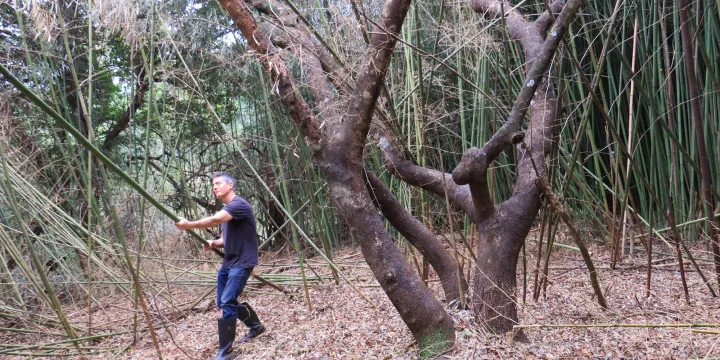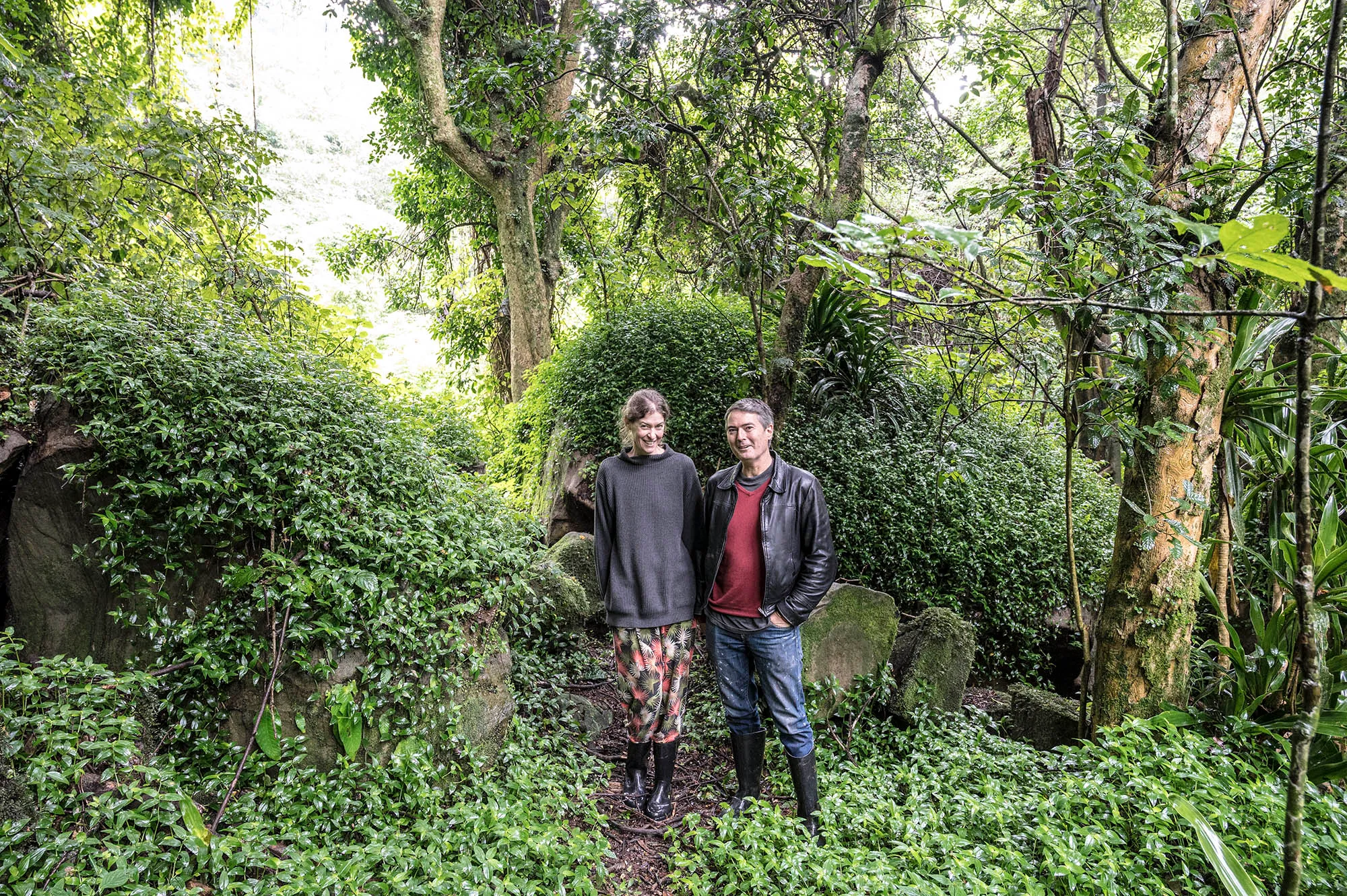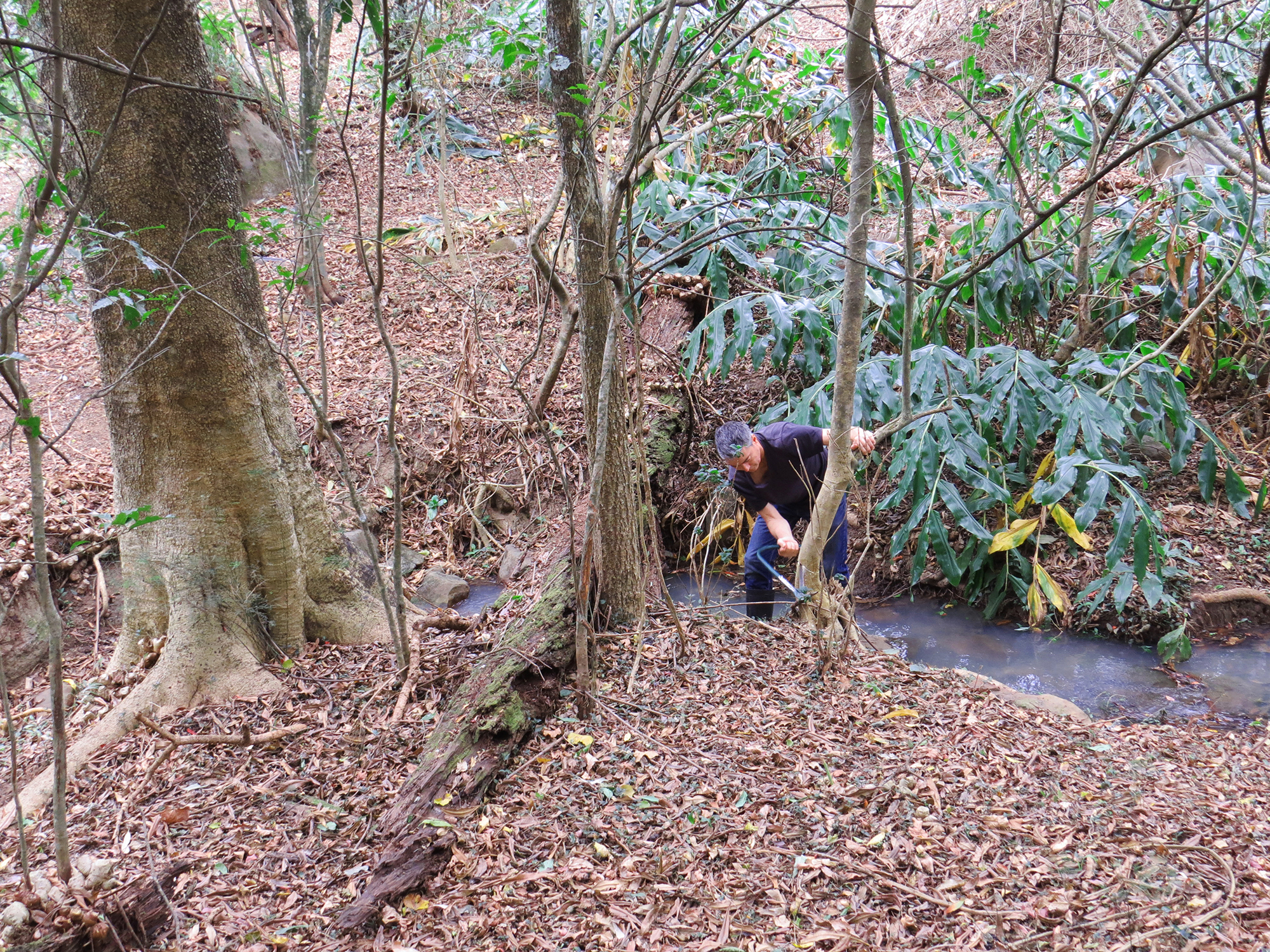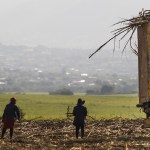OUR BURNING PLANET
Ecoactivists spearhead mistbelt biodiversity drive while Pietermaritzburg battles to see the forest for the alien trees

Ferncliffe Nature Reserve will soon be restored to its natural state thanks to the efforts of an eco-couple who are passionate about removing alien species.
Connor Cullinan (53) and Janine Stephen (49) are on a mission to get the Ferncliffe Mistbelt Forest and Nature Reserve back to its original state.

Ferncliffe forest and the gum tree plantation in the background that seems to be sucking the forest dry. (Photo: Dave Southwood)
Their plan is to remove alien vegetation that has taken over the area and allow the natural forest to reclaim the space by planting and nurturing appropriate species. This allows the forest to be rewilded and a natural ecosystem to develop.
According to the project’s website, Ferncliffe is small, the remnant of a biome that originally stretched over about 2,000 hectares on the fringes of Pietermaritzburg. “It still contains an astonishing diversity of life, from large mammals like bushpig and caracal, to unusual millipedes, amphibians, a carnivorous snail and the enormous, monkey-catching crowned eagle. Only 0.5% of land in South Africa is forested, and humid, damp mistbelt forest makes up just a fraction of this.”
The couple started the project three weeks ago after returning to the area six months ago. Cullinan grew up around the forest and Stephen met him when both attended university in Pietermaritzburg.
“One of the things that tied us was walks and scrambles through Ferncliffe together, sometimes at night. I liked watching him negotiate wild places without flinching, never hesitating. I was suburban soft in comparison,” she says.
Over the years the two have held the same love for the vegetation in the forest.
After spending time in Cape Town they decided it was time to return to the area and to bring life back to it. They say rewilding is the best way to do this.
According to Stephen, nature knows best — but even nature needs a helping hand.
One of the greatest issues is the invasion of alien plants — bamboo, bugweed, Kahili ginger lily, inkberry, Cestrum, Lantana and Mauritius thorn. Cullinan says it is unknown how the alien species made it into the forest and nature reserve, but they have spread out and made it difficult for natural vegetation such as snake lilies and forest bushwillow that are supposed to be growing there to flourish.
The other area of concern is the growing of gum trees close to the nature reserve. Gum trees are known to suck up a lot of water and, like the other alien vegetation, make it difficult for indigenous vegetation to survive.
So far the rewilding project has seen 12 trees planted and 47 square metres of alien vegetation removed.
Cullinan said the alien vegetation has managed to take hold largely because the forest is being neglected as the municipality faces challenges such as being short-staffed. Another cause of the spread in the alien vegetation is animals eating plants or their fruits and dropping them in other parts of the forest.
To assist their work, the couple has registered an NGO through which people can assist financially or through plant donations to the project.

Connor Cullinan and Janine Stephen in Ferncliffe. (Photo: Dave Southwood)
They are also calling on travellers to the country to offset their carbon footprint by planting or donating to the planting of indigenous trees in the area. Whether this is something travellers will be interested in will be tested properly only once Covid-19 travel restrictions are lifted.
Part of the money donated to the project will be used to create jobs and awareness about the importance of rewilding areas.
Cullinan says when they speak to people about the nature reserve and forest, the natural response is their concern about the alien vegetation with some saying they have forgotten what the area was like before.
Recalling his childhood in Ferncliffe, Cullinan describes an area that was “more rural — there was a dirt road and only seven houses”. Now it’s an extensive suburb. He remembers a proliferation of rock rabbits (dassies) and crown eagles. Disease has wiped out the dassies and eagles are rarely spotted now.
Besides the restoration, the couple is advocating for the nature reserve to be a protected area that they hope will have an impact on the number of gum trees grown in the area.
Senior lecturer in Agrometeorology at the University of KwaZulu-Natal (UKZN), Dr Alistair Clulow, says in terms of biodiversity “a lot of species are becoming extinct because of a loss of habitat. It’s much healthier to have natural or indigenous vegetation because obviously the birds, animals and insects will be able to live in that environment comfortably because there’ll be food from those plants and those animals are adapted to those plants. It’s a much better fit and a much happier ecosystem in terms of biodiversity.”
This also helps with natural control as indigenous vegetation will provide food for the animals naturally found in those areas. Alien vegetation takes over because there are no natural control measures in place, he said.
“Without human intervention, indigenous vegetation can never eradicate alien vegetation because it’s got no pests and diseases naturally here and it’s got no animals eating it. It does much better than indigenous vegetation. It gets in first and it grows quickly and once it gets high and it shades the indigenous vegetation around it, the indigenous vegetation just doesn’t survive,” says Clulow.
Alien vegetation tends to consist of quite thirsty plants that use a lot of water from streams and groundwater which leads to surrounding water sources drying up.

Connor Cullinan clearing inkberry (cestrum laevigatum) and kahili ginger. Left shows cleared area, ginger leaves to the right. (Photo: Janine Stephen)
Msunduzi Municipality spokesperson Thobeka Mafumbatha says the municipality is attending to invasive alien plants through a programme that is managed by the conservation section through the Expanded Public Works Programme and the Msunduzi alien control team.
She says the municipality started the programme in an attempt to comply with the Conservation of Agricultural Resources Act and also with the National Environmental Management of Biodiversity Act.
“Alien species can spread rapidly with negative consequences for native species. Invasive plant species have an impact on the diversity of local species, they affect water availability and damage the quality of soil nutrients. Once an alien plant has invaded a habitat, it changes the conditions of that environment,” said Mafumbatha.
While the municipality is trying to tackle the issue, a lack of resources including tools of trade and staff are making things difficult.
Mafumbatha said the municipality has collaborated with a number of stakeholders such as Wildlands Conservation Trust, Conservation Outcomes and the environment department in order to eradicate alien invasive plants and to improve the water quality of Ferncliffe Nature Reserve and surrounding areas. Even though the gum tree plantation is a primary concern in terms of water resources, Mafumbatha maintains that the “plantation is managing its corridors very well in order to avoid conflict of interest between forest and nature reserve”.
Mafumbatha confirmed that there are moves to declare Ferncliffe Nature Reserve as a formally protected area “under the Protected Areas Act (Act 57 of 2003)”.
She said as part of this process, biodiversity site assessments would be conducted to determine which protected area category the area qualified under. DM/OBP



















Bravo! I wish you well. The municipal “forests” west of PMB are a revolting testament to colonial tree planting that has engulfed the small pockets of indigenous forest on the sharp. My very best wishes for your rewinding. And it’s good for the soul.